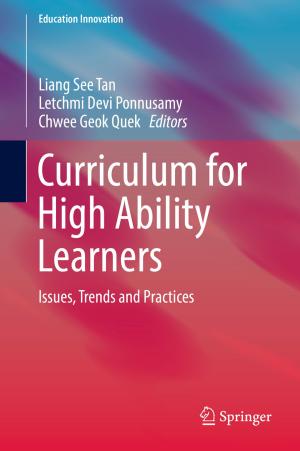Students with Intellectual Disabilities
Insights, Implications and Recommendations
Nonfiction, Reference & Language, Education & Teaching, Educational Theory, Educational Psychology, Philosophy & Social Aspects| Author: | Poulomee Datta | ISBN: | 9789812870179 |
| Publisher: | Springer Singapore | Publication: | March 31, 2014 |
| Imprint: | Springer | Language: | English |
| Author: | Poulomee Datta |
| ISBN: | 9789812870179 |
| Publisher: | Springer Singapore |
| Publication: | March 31, 2014 |
| Imprint: | Springer |
| Language: | English |
This book investigates the self-concept of the students with intellectual disabilities who were placed in specialist and mainstream educational settings in South Australia. It gains insights into what students with intellectual disabilities felt about themselves and their achievements across the different dimensions of self-concept. It is divided into two stages of execution. In Stage 1, the Tennessee Self-Concept questionnaire was administered to students with intellectual disabilities. In Stage 2, interviews were conducted with students with intellectual disabilities, their parents and teachers. These data reflected a range of viewpoints from which to examine the research questions. These findings have implications for teachers, special educators, policy makers and a range of professionals in the education and special education sector in enabling greater understanding of the problems experienced by these students and pointing to modifications and improvements in the services for these students.
This book investigates the self-concept of the students with intellectual disabilities who were placed in specialist and mainstream educational settings in South Australia. It gains insights into what students with intellectual disabilities felt about themselves and their achievements across the different dimensions of self-concept. It is divided into two stages of execution. In Stage 1, the Tennessee Self-Concept questionnaire was administered to students with intellectual disabilities. In Stage 2, interviews were conducted with students with intellectual disabilities, their parents and teachers. These data reflected a range of viewpoints from which to examine the research questions. These findings have implications for teachers, special educators, policy makers and a range of professionals in the education and special education sector in enabling greater understanding of the problems experienced by these students and pointing to modifications and improvements in the services for these students.















